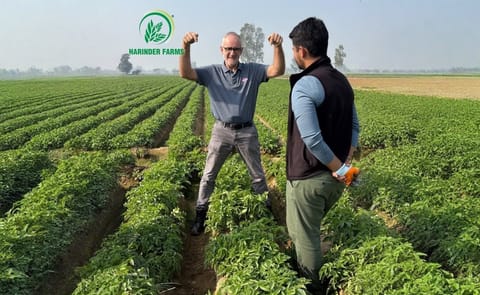Microtuber potato cultivars used in research by the Wisconsin Seed Potato Certification Program in a growth room at the Biotron Laboratory at UW–Madison (Courtesy: Bryce Richter)
New Wisconsin State laws force potato growers to apply best practices

Wisconsin Gov. Scott Walker signed two new measures involving the potato industry last Wednesday.
One law requires potato growers to use certified seed potatoes if planting 5 or more acres.
The other measure shortens the response time allowed when farmers are notified of the presence of late blight in their crop from the state Department of Agriculture, Trade and Consumer Protection
Both laws are widely seen as beneficial to the Wisconsin Potato Industry.
Mandatory use of Certified Seed Potatoes
For farmers planting 5 or more acres of potatoes, the use certified seed potatoes is mandatory.
Alex Crockford, director of the Wisconsin Seed Certification Program through the University of Wisconsin-Madison:
"It’s a requirement that just about every one of the other seed states in the country that grow seed potatoes already have."
The Wisconsin Seed Certification Program certifies that seed potatoes grown in the state are free of damaging levels of viruses or diseases.

Wisconsin Seed Certification Program
Alex Crockford:
"Certified seed goes through a various amount of lab testing too before it can be replanted.”
“So the commercial grower that's buying the seed knows that it's virtually free of any disease that may cause a yield or harvest or storage limitations."
Certified seed potatoes do cost more. But Crockford said most commercial growers already use certified seed because many potato processors require it.
Tamas Houlihan, executive director of the Wisconsin Potato & Vegetable Growers Association, said getting the roughly 2 percent of growers who don’t use certified seed potatoes to start will be good for everyone in the industry.
Tamas Houlihan:
"These diseases are not just that grower's problem.”
“They can spread through the wind and rain and get on neighboring fields."
Responding Faster to Late Blight
Governor Walker also signed a law that shortens the amount of time growers have to respond to late blight of potatoes, the disease that caused the Irish Potato Famine in the 1840s.
Growers now have 24 hours to treat plants with late blight or 72 hours to destroy them after receiving notice from the state Department of Agriculture, Trade and Consumer Protection (DATCP).
Previously, DATCP gave farmers 10 days to address the issue, a time frame that Houlihan said was too long.
Tamas Houlihan:
"By the time the abatement was ordered, (late blight) might have already been in the field for a week or 10 days.”
“If you also give the person 10 days to treat, we're looking at three weeks and by that time the disease can spread."
Houlihan said more potato growers are proactive about preventing and responding to late blight.
Tamas Houlihan:
"We just wanted to make it a law on the books and give it a little bit more teeth when the Department of (Agriculture) would have to come in."










